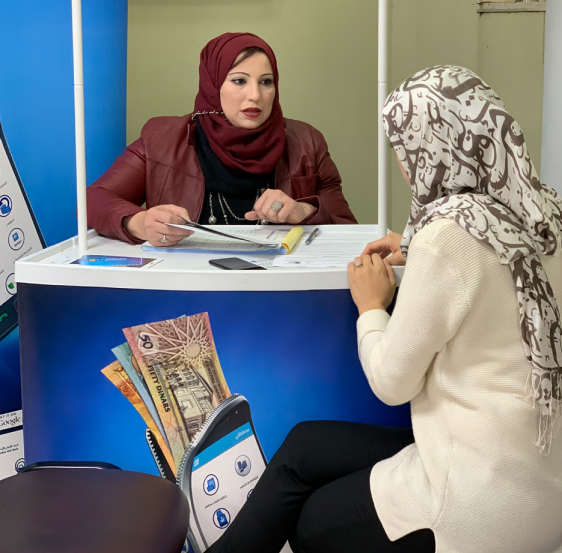
Scaling the Financial Inclusion Pyramid in Egypt 2018 - 2020
Intervention
AWEF undertook a financial sector mapping to identify the constraints to women’s access to, and use of, financial services while harnessing the power of digital financial services to drive female financial inclusion and economic empowerment.
By making financial services more widely available and lowering costs and barriers to access finance, financial technology (fintech) can democratise financial services to the masses.
Partners
AWEF (Arab Women’s Enterprise Fund), FCDO
Key Results
- Following the success of the pilot, Fawry, a private sector partner, worked to develop epayment services to microfinance clients, reaching 100,027 women across Egypt.
- As a result of the study, Fawry onboarded (with the support of AWEF) 196 female Heya Fawry agents as part of a pilot, who performed 54,000 transactions, worth a total of 1,460,000 EGP
In a bid to accelerate women’s financial inclusion in MENA the Arab Women’s Enterprise Fund (AWEF) led a study to understand the scope for Digital Financial Services (DFS) in Egypt, map key constraints to women’s financial inclusion, and identify opportunities to transform the livelihoods of low income Egyptian women through improved access to finance.
You may also view this case study as a downloadable pdf.
Egypt now has about 23.2 million un-banked or under-banked adult women.
Making the business case for the private sector
The private sector is an essential partner for WEE programmes. By adopting business practices that include and support women as workers, consumers, producers and suppliers, companies can not only make an important contribution to the process of WEE, but also expand their market, achieve greater business efficiency, and improve their bottom line.
Women as consumers
When it comes to WEE programming, women are often primarily regarded in their role as employees and suppliers or producers. AWEF has implemented several interesting programmes that focus on women in their role as consumers. In Egypt, AWEF conducted an elaborate study to learn more about the barriers women were facing to access financial services. In 2019, only 27% of adult women had a financial account (versus 39% for men). At the same time, the huge rise in DFS offered promising opportunities to further increase women’s access and agency over financial resources – both at the microenterprise and household levels. The study outlined three types of constraints for accessing financial services:
- Demand constraints, i.e. limited financial literacy, social and cultural norms
- Supply constraints, i.e. limited bank presence in rural areas, limited sex-disaggregated data
- Environmental constraints; i.e. inheritance laws, know your client regulations
While not specific to women only, these constraints appeared to be experienced by women in a more acute way.
The key to success is for practitioners to understand what stops women from participating in markets, and to effectively “sell” the benefits of new innovations and encourage private sector partners to test and change their business practices so that they are more inclusive of women.
Private sector engagement
In a bid to bridge these constraints while capitalising on the fast growing digital finance ecosystem, AWEF developed a strategy to help poor women scale the financial inclusion pyramid in Egypt:
- AWEF facilitated the introduction of the very first e-learning platform in Arabic targeting more than 3,500 low-income female microbusiness-owners in Egypt, in partnership with Vodafone Egypt and Tasaheel Microfinance, a leading microfinance institution.
- AWEF worked with fintech institutions to strengthen the supply of DFS, by supporting them in the development of gender-focused strategies, tailored products and distribution channels that cater to women’s specific needs. AWEF piloted the very first female agent network in Egypt in partnership Fawry.
- AWEF generated and disseminated insights on main challenges, opportunities and innovative models for closing the digital and financial gender gaps in Egypt. This has acted as an ‘eye-opener’ for several financial services firms, including Fawry and Vodafone.
Finally, AWEF’s experience in the DFS sector in the MENA region resulted in eight important lessons learned for making DFS work for women (included on the right), including to integrate non-financial services into DSF delivery, expand the access to universal digital identities to help low-income women build their credit history and invest in sex-disaggregated data.
Want to learn more?
- Practitioner Learning Brief - Working with the Private Sector to Empower Women: What to Measure and How to Build the Business Case for Change, AWEF, 2019
- Fintech for Women: Scaling the financial inclusion pyramid in Egypt, BEAM Exchange, 2019
- Practitioner Learning Brief - Making Digital Finance Work for Women in the MENA Region: Eight lessons from the field, AWEF, 2021
- https://seepnetwork.org/AWEF-Learning-Series